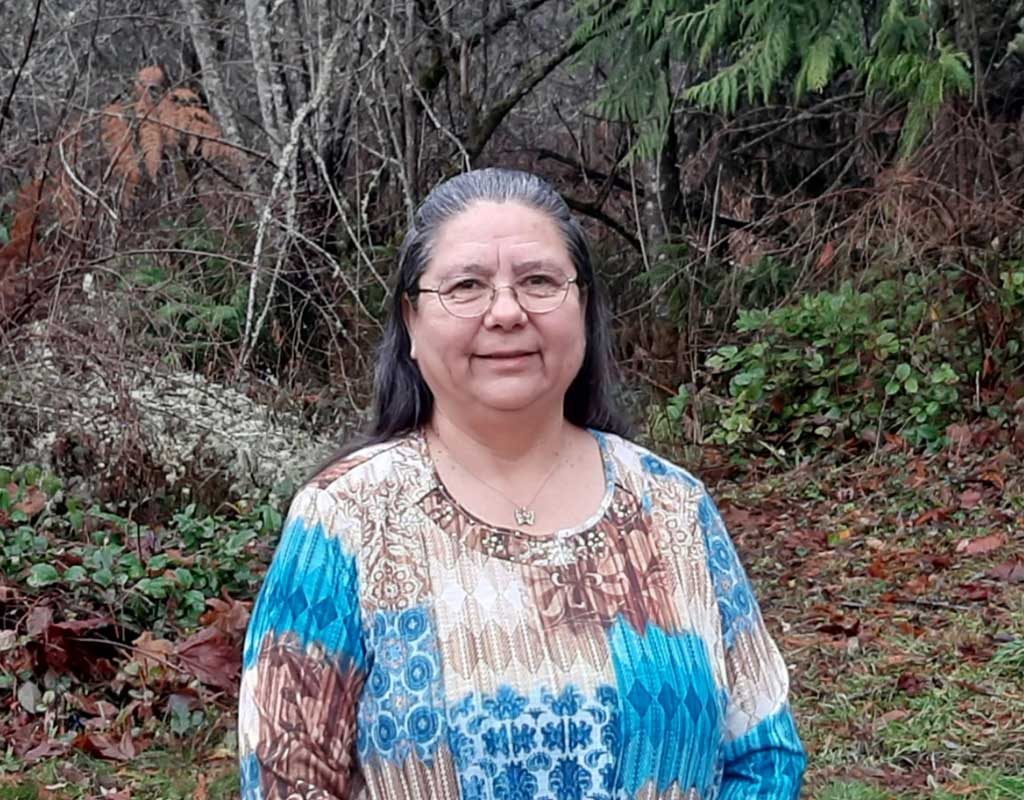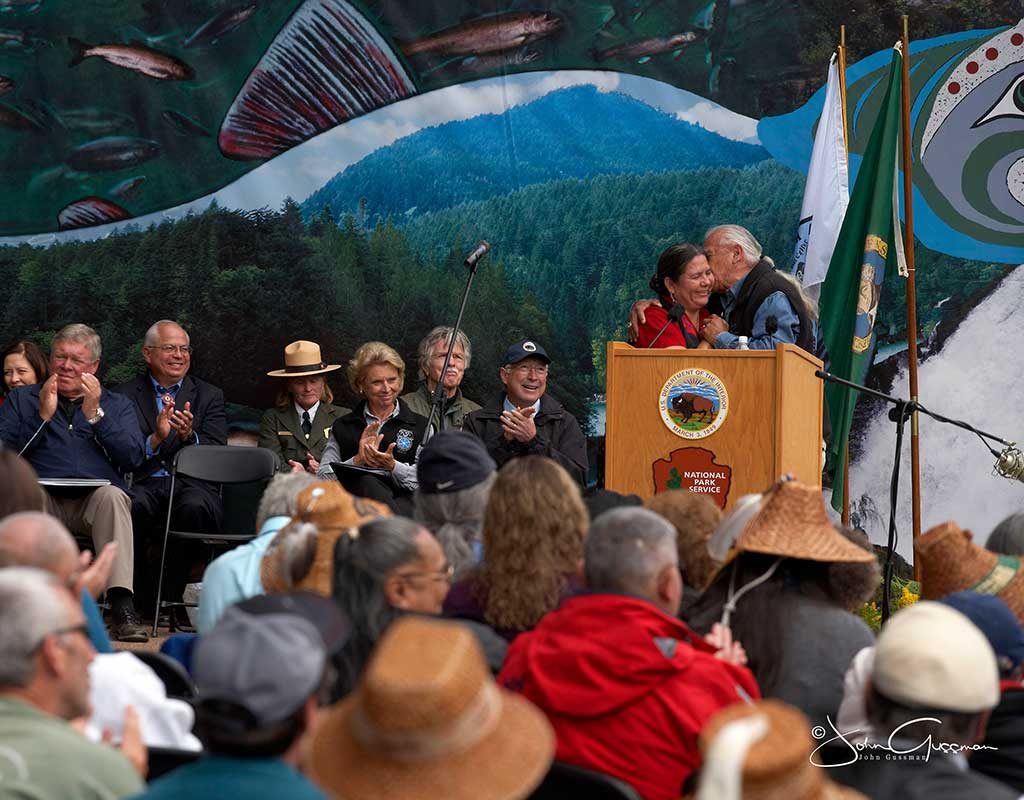
Guest Writer
Frances Charles photographed for the 2015 Enduring Spirit Awards. Photo credit: Mel Ponder Photography
Frances Charles (Lower Elwha), Chairwoman of the Lower Elwha Klallam Tribe, is a recipient of the 2023 Indigenous Leadership Awards.
Humbled by the ancestors.
It could never happen in her lifetime, Frances Charles was told even before she was elected Chairwoman of the Lower Elwha Klallam Tribe. Yet in 2012, the result of more than two decades of skillful negotiations led by Charles on behalf of her tribe, the Elwha Dam was breached and removed.
Now the Elwha runs free, all 70 miles of wild river and tributaries, welcoming back six species of Pacific salmon, Dungeness crab, eelgrass, and more than 100 acres of newly formed beach. Dam removal has restored the Tribe’s cultural ties to the landscape and the lifeforce of wild salmon, Charles said, and has fulfilled a sacred obligation to the tribal ancestors.
Charles is honored with a 2023 Ecotrust Indigenous Leadership Award for her outstanding leadership in removing two dams from the Elwha River and for mentoring Indigenous women, encouraging them to take on leadership positions and make their voices heard.
Because of these experiences, [Charles] encourages younger women to enter political work and to take on leadership roles, just as she was encouraged by other women elders and political leaders.
The demolition of the Elwha Dam represents to date the largest dam removal project in U.S. history. The dam blocked all but the lower five miles of river, effectively halting salmon migration to their spawning and rearing habitats, which provided both the material and spiritual sustenance for uncounted generations of the Lower Elwha Klallam people.
“What we were trying to do was not only for ourselves,” said Charles. “We wanted to bring back the natural environment, our ties to the land, our ties to the river.”
With the restoration of the Elwha River to its natural flow, including demolition two years later in 2014 of Glines Canyon Dam in the upper Elwha, most salmon species are returning to their ancestral home in record numbers. This fall marks the first opening in decades of a tribal ceremonial and subsistence coho fishery, a treaty-protected right that the Tribe has been unable to exercise since the dams were built more than a century ago.

Frances Charles. Photo courtesy of Frances Charles
Charles, her voice low and calm, is known for her strength of character, quiet authority, and a deep commitment to the traditional cultural life of the Elwha people. During Elwha Dam negotiations, Charles advocated for the interests of the ancestors, an intentional focus to respect Indigenous spirituality. This “radical” approach in government-to-government consultation helped shape the negotiations and its ultimate resolution.
Negotiations over the years have taught her a number of skills—patience, how to step away from seemingly intractable conflict, how to respond to gaps in knowledge about the tribe’s cultural and spiritual considerations. She studies issues deeply and carefully before she begins a collaboration. Her strategy at the negotiation table is to listen, absorb, and take time before making a decision. And compromise, she said. “I learned how to forgive and forget. I really had to work within myself to let the past be the past.”
Charles grew up in a family deeply involved in tribal government and politics. She was born and raised in Port Angeles where she has lived all of her life, the Elwha River in her backyard and to the north, the Strait of Juan de Fuca, the border between Canada and the U.S. After graduating from high school, she joined the U.S. Forest Service as a firefighter and grappled with discrimination — the assumption that she had been hired not because of her abilities but because of being a Native American woman — an attitude, she said, that made her work harder.
Even as elected leadership, [Charles] was confronted with the same but different perception that because she is a woman, she had to prove herself.
“The bottom line was somebody telling me I wouldn’t be able to do it,” she said. Her internal response was, okay, the challenge is on. In the next 12 years, she rose in the ranks of the Olympic National Forest fire crew including overseeing the helicopter fire crew. By the time she decided to go to work for her Tribe, she had become one of the top woman crew leaders on the Olympic Peninsula.
Charles was elected to Tribal Council and then as Chairwoman, a role she has served in for more than two decades. Even as elected leadership, she was confronted with the same but different perception that because she is a woman, she had to prove herself.
“It was a challenge for me as a woman,” she said. “Challenging to be in an environment and be recognized for who I was in my leadership.”
Because of these experiences, she encourages younger women to enter political work and to take on leadership roles, just as she was encouraged by other women elders and political leaders. The demands on any tribal chair can be all-consuming, she said. “It’s 24/7. Having that ability to say no, that’s one of the hardest things to do.” The hours and weeks and years of work on behalf of her Tribe, she said, was possible only because of the support of her family.
“
I respect all our Elders and previous council members who had set the path for us. If it wasn’t for them, we wouldn’t be where we are today.
—FRANCES CHARLES
Charles said the Tribe will continue to protect the river by acquiring additional land bases. Another important focus is safeguarding the ancient Tse-Whit-Zen village and tribal cemetery site along Port Angeles Harbor. The 2,500-year-old village and burial site was unearthed as part of a major excavation for a dry dock project for the Port of Port Angeles and, while an archaeological survey is ongoing, a fence has been erected that cuts through the ancestral village.
Witnessing the burial sites, unearthing tribal ancestors to relocate them, was spiritually and culturally overwhelming, she said, and impacted all of us as a Tribe. Respect for this ancient site, she said, is not negotiable. “The land itself is very powerful,” she wrote. “It is sacred, it is ceremonial, and it has a lot of strong powers.”

Frances Charles with Billy Frank, Jr. on the ceremonial day to remove the Lower Elwha Dam. Photo by John Gussman.
Charles presided over one of the most historic moments for her Tribe — restoring a river that is the spiritual and ancestral home for the Tribe and salmon. On the ceremonial day to mark removal of the dam, more than 400 people attended the ceremony — tribal leaders including Billy Frank, Jr., the Lower Elwha Tribal Council, members of Congress, national agency directors, and elders. Charles said she was humbled to “be where I was standing on that day, humbled by the ancestors and the Creator.”
It was an occasion so profound, Charles said, “It was very hard to compose myself because of the pride and the happiness that our elders had fought so hard, that they were able to witness it in their lifetimes. I respect all our Elders and previous council members who had set the path for us. If it wasn’t for them, we wouldn’t be where we are today. Those dams coming out — it’s something I can never forget.”
Frances Charles shares remarks and reflections during the 2023 Indigenous Leadership Awards.

PRESS RELEASE
PORTLAND, Ore. — July 17, 2023 — Ecotrust today announced the recipients of the 2023 Indigenous Leadership Awards.

Project page
A celebration of the determination, wisdom, and continuum of Indigenous leadership across the region.